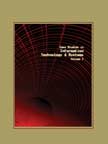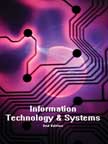Information Technology & Systems
 |
Details
Textbook Edition: II
Pages : 490;
Paperback;
210 X 275 mm approx.
Detail Table of Contents
Workbook Edition: II
Pages : 231; Paperback;
210 X 275 mm approx.
Pricing
Textbook Price: Rs. 900;
Workbook Price: Rs. 700;
Available only in INDIA
<< MIS - Implementation, Evaluation, and Maintenance
Information Resources Management and IT Governance : Chapter 13
SUMMARY: Information resource management (IRM) is a new concept and is used in the management of information to facilitate the smooth flow of productive and updated information across the departments in the organization. Knowledge is the result of using information combined with human experience. Knowledge management is the process of creation, retention, updation, dissemination, and exploitation of knowledge. Knowledge management encompasses IRM in scope and IRM acts as the platform for carrying out the knowledge management efforts. Security of organizational information has become a prime concern for every organization that implements information systems. Threat from internal and external manipulators of information is on the rise and managements too have gone ahead with implementation of more secured systems to protect their information from any threat. |
|
In this scenario, information security management has gained importance and the British Standards Institute came out with a standard for information security management called ISO 17799 in 2001. According to this standard, managements have to install various security controls to protect the information.
|
The social and ethical dimension of IT is an evolving concept and it addresses those issues which are considered unethical and/or illegal in the implementation and usage of information systems. Four ethical areas have been identified by Mason on these issues. They include right to privacy, right to accuracy, right to property, and right to access (PAPA). |
The need for IT governance has gained prominence after companies started using IT in business operations. This need gained even more importance after a series of accounting scams took place and resulted in the passing of legislations like the Sarbanes-Oxley (SOX) Act. The chapter discusses the salient features of the Act and its role in IT governance. Frameworks for IT governance include Control Objectives for Information and Related Technology (COBIT), IT Infrastructure Library (ITIL), and the Balanced Scorecard.
Related Books:-
 Case Studies in IT and Systems
Case Studies in IT and Systems
263 pages, Paperback
Available only in INDIA

